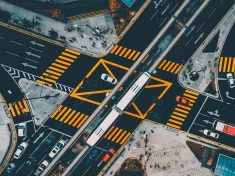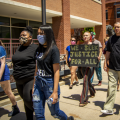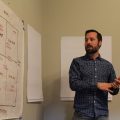
This post was written by Maggie Gómez, a former member of our team.
One of the main reasons I chose to join Center for Health Progress two years ago was because I realized that “health equity” was just another word for the social justice work I had already been doing for over a decade. Over my years as an organizer and policy advocate, I had seen community members become homeless, struggle to manage their health because they lacked paid health leave, be excluded from better paying jobs because of prior convictions, and face extreme hardships because of their immigration status. Fixing those injustices is health equity work, and this is where I find my purpose: in building power to transform our broken systems to help people survive and thrive.
It has been well-known and documented for decades that factors such as race, income, and ZIP code are big influences on whether a person will live a long and healthy life or not. But, none of these factors stands alone. Each of our identities—as a woman, a person of color, being LGBTQ, having a disability, among others—are inextricably linked to each other. Recognizing that we all carry many identities that come with varying levels of power and privilege is called intersectionality.
I am yielding this moment to honor and thank Kimberlé Williams Crenshaw, leader of the development and introduction of the theory of intersectionality. As a black feminist, this inspiring thought leader was the first to put words to the intersection of social identities, and how they work in relation to systems of domination and oppression. As a biracial woman who grew up working class and moved to the middle class, in a family with immediate family members who have disabilities and mixed immigration statuses, learning about this was liberating. I was finally able to begin putting a name and words to what I was living and feeling daily.
The US has a long and shameful history of building institutions rooted in racism, sexism, and classism, among other deadly ideologies, which has intentionally limited our opportunities to live a healthy life. However, treating the individuals harmed by these systems and policies as a monolith—that all black people or all women or all people living in poverty have the same needs and goals—is a harmful approach to systems change. When we apply a lens of intersectionality to our health equity work, we broaden our definition of health and seek solutions that better address community needs.
As Audre Lorde said best, “I am not free while any woman is unfree, even if her shackles are very different from my own.” As we build a multiracial movement for health equity through intersectional community organizing, I’m fighting for the same things I’ve always been fighting for: civil rights and liberation for all. We’re centering racial justice and honoring the intersectionality of people’s lives and identities so that the opportunity to live a healthy life isn’t a privilege but a right. Join us!




